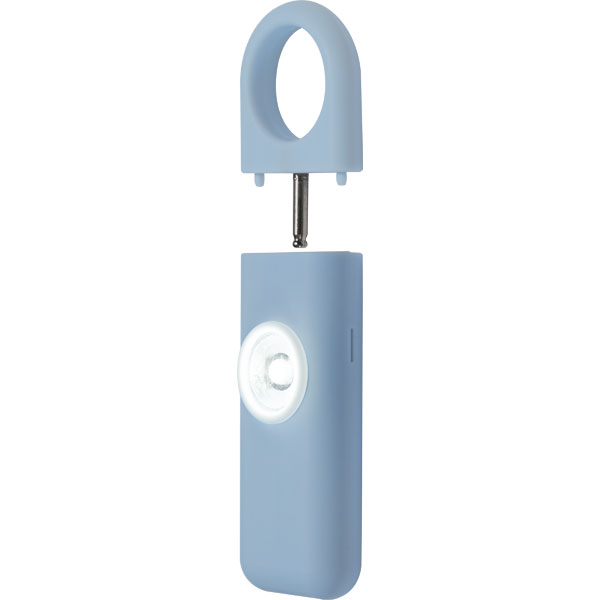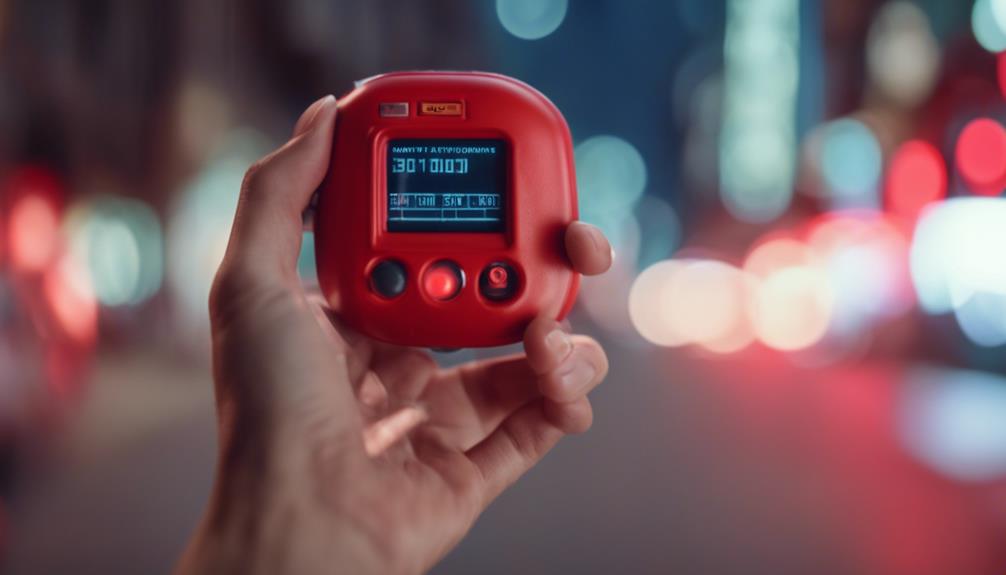
Brainstorm Security Shop

For Orders Over $199

On Any Of Our Products

Details On Refund Page
Imagine you’re walking alone at night, the streets are dimly lit and quiet. Suddenly, a sense of unease washes over you. What’s your plan? Here’s where a loud personal alarm can be your unexpected hero. Emitting a sound that can reach up to 130 decibels, this small device can disorient an aggressor and signal for help when you need it most. You might think it’s just a noisy gadget, but have you considered its real-world effectiveness and the sense of security it provides? Let’s explore how this simple tool could make a significant difference in your life.
Carrying a loud personal alarm can significantly enhance your safety by deterring potential attackers. When you’re walking alone at night or in less populated areas, having this simple device could make all the difference.
It’s not just about the noise; it’s about creating a moment of surprise and confusion for the aggressor, giving you time to escape or draw attention.
Think about it: attackers rely on silence and isolation. If your alarm emits a deafening sound, you disrupt this advantage, potentially scaring them off. It’s a form of empowerment—knowing you have a tool to protect yourself can boost your confidence and reduce fear during your daily activities.
Moreover, you’ll find that these alarms are particularly useful in situations where you might feel vulnerable—like jogging early in the morning or navigating through a crowded parking garage late at night. They act as an immediate call for help, signaling others nearby that you’re in trouble.
This can be especially crucial in areas where assistance isn’t readily available or if you’re unable to call for help yourself.
Most personal alarms share several key features that enhance their effectiveness in protecting you. Firstly, you’ll find that loudness is a crucial aspect. These devices typically emit a sound ranging between 100 to 130 decibels, ensuring it grabs attention when you need help. The high-pitched noise can disorient an attacker and alert passersby, even from a distance.
Another essential feature is the ease of activation. Personal alarms come with simple mechanisms, such as pull pins or push buttons, designed for quick use in stressful situations. You don’t need to fumble around; a quick action can activate the alarm to deter threats immediately.
Portability is also key. You can easily attach most personal alarms to your purse, keys, or belt loop. Their compact size means you can carry them everywhere without hassle.
Lastly, durability plays a significant role. Your personal alarm is built to withstand rough handling and environmental conditions. Whether it’s rain or accidental drops, these devices are made to be reliable when you most need them.
Now let’s explore the different types of personal alarms you can choose from. These handy devices come in various forms, each designed to suit particular preferences and situations.
Firstly, there’s the keychain alarm, arguably the most common type. It’s compact and attaches easily to your keys, making it accessible whenever you’re on the move. You’ll find that most emit a loud sound, often reaching up to 130 decibels, to deter attackers and alert passersby.
Another option is the pendant alarm, which you can wear around your neck. This type is especially popular among seniors or individuals with health issues, as it often includes a fall detection feature that automatically triggers the alarm.
For those who prefer discretion, pen alarms are available. They look just like a regular pen, yet they’re equipped with an alarm system. This type is ideal if you’re looking for something that blends seamlessly into your everyday carry.
Lastly, there are wristband alarms, which are perfect for runners or active individuals. These are typically wearable, waterproof, and shock-resistant, offering peace of mind during outdoor activities.
Each type has its unique advantages, so it’s crucial to consider your lifestyle and needs when choosing the right personal alarm for you.

Personal alarms prove their worth by offering crucial security in unexpected situations. Imagine you’re walking home late at night and sense someone following you. A quick press of your personal alarm can emit a shocking, loud sound that draws immediate attention to your location and potentially scares off the aggressor.
It’s not just about deterring threats; it’s about feeling safer and more confident in your daily life.
You’ll find these alarms especially useful in places where you’re isolated or vulnerable. Whether you’re jogging in a secluded park, navigating a poorly lit parking garage, or traveling in unfamiliar cities, having a personal alarm at your fingertips provides a straightforward defense mechanism.
It isn’t just theoretical; many users have shared stories where activating their alarm has brought helpers to their side swiftly or caused suspicious individuals to back off.
Moreover, the psychological impact can’t be underestimated. Knowing you’ve got a way to alert others and call for help keeps you from freezing up in fear. Instead, you’re empowered to act, making you a harder target.
Personal alarms don’t guarantee absolute safety, but they significantly enhance your ability to protect yourself in many real-world scenarios.
Selecting the right personal alarm involves considering your lifestyle, environment, and specific safety needs. If you’re often out late at night, perhaps walking from work or attending classes, you’ll want a highly portable alarm that’s loud enough to deter an attacker and draw attention.
On the other hand, if you’re primarily using it in potentially isolated areas, like hiking trails, consider an alarm that features GPS capabilities or connectivity to emergency services.
You should also consider ease of use. Can you operate it quickly under stress? Test different models to see how easily you can activate them. Look for one with a simple mechanism that doesn’t require complex handling. The size and design matter too—small enough to keep on your keychain, but with a secure grip that won’t slip out of your hands.

Maintaining your personal alarm involves regularly checking the battery life and ensuring the device is free from physical damage. It’s crucial to replace the batteries or charge the device as recommended by the manufacturer to keep it in optimal working condition.
Don’t wait until it’s too late; test the alarm monthly by activating it briefly to confirm it’s loud and clear.
You should also keep the alarm clean and dry. Wipe the surface with a soft, dry cloth to remove dust and debris. Avoid using harsh chemicals or water, as these could damage the internal components.
If your alarm has a clip or keychain, check these parts for signs of wear and tear. Replace them if they’re no longer secure, as a lost alarm won’t be there when you need it most.
Lastly, store your alarm in a cool, dry place when not in use. Extreme temperatures and moisture can impair the functionality of the device.
You should also consider the legal implications and ethical responsibilities when using a loud personal alarm. Depending on where you live, there are varying regulations governing the use of these devices. It’s crucial to check your local laws to ensure you’re not violating any noise ordinances or other legal restrictions. Generally, these alarms are legal as they’re intended for personal safety, but improper use could potentially land you in hot water.
Ethically, it’s important to use your alarm judiciously. Triggering it inappropriately can cause unnecessary panic and could desensitize others to the sound, reducing its effectiveness in a real emergency. Think of it as a fire alarm: you wouldn’t pull it without a valid reason, right?
Moreover, consider the impact on those with sensory sensitivities. The high decibel level, typically ranging from 110 to 140 dB, can be particularly distressing and harmful to individuals with conditions such as autism, PTSD, or hyperacusis. Always weigh the urgency of your situation against the potential harm or disruption your alarm might cause.

You’ve explored the powerful features of loud personal alarms, from their surprising volume to their simple activation.
Whether you’re walking home late or just want extra security, choosing the right model can make all the difference.
Remember to maintain your device regularly and stay informed about local laws regarding its use.
With the right personal alarm in hand, you’ll feel safer and more confident, no matter where life takes you.

Brainstorm Security Shop
1867 Caravan Trail
Ste 105
Jacksonville, FL 32216
Call us toll free: (800) 859-5566